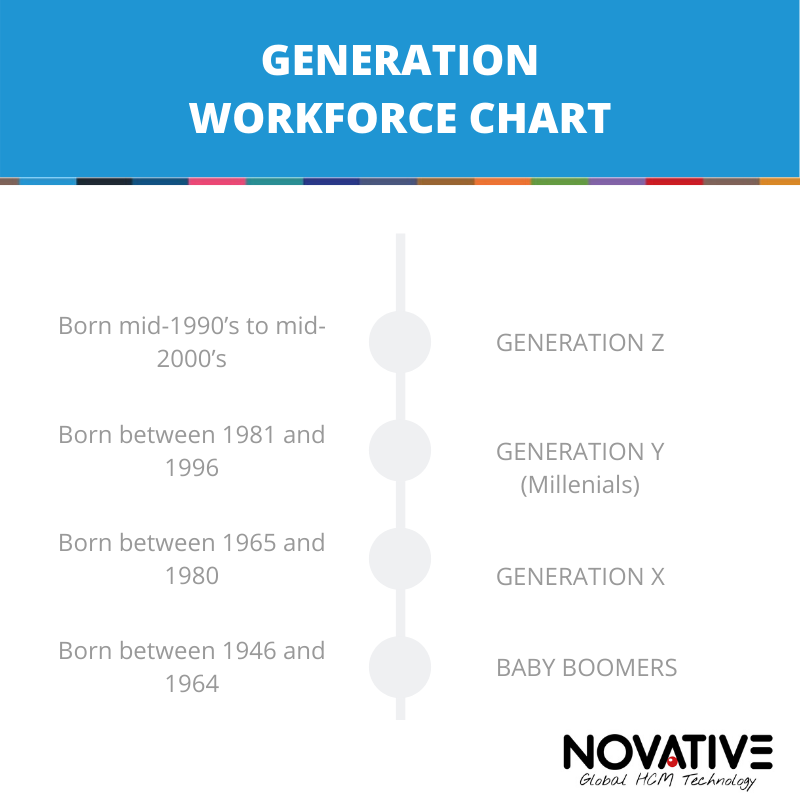HR Trends of 2020?
We are in the new decade and leaving behind a decade that saw a substantial change in HR. The 20 teens saw the rise of HR tech bringing in a range of solutions. As we enter this new decade a very different change is on the horizon, the intergenerational workforce. Never have so many generations been in a workforce. This change will influence every aspect of HR, from recruitment, leadership, and organisational values.
Business Leader has stated: “It’s predicted that by 2020 the global workforce would be dominated by millennials (35%) and generation X (35%), with baby boomers only making up 6%.”
Organisations will now have to navigate between these generations different needs and get ready for the next impending generation – Generation Z.
Break down of the generation workforce
What do different Generation desire from their jobs?
Baby Boomers
Baby boomers have been the longest-serving generation in the current workforce. Due to this, they aspire to have job security as they are approaching retirement and are looking to wind down at the end of their career. Through their working life, careers and goals have been defined by employers, and the bottom line of the company has been the focus.
Generation X
Generation X has the benefit of living in a time before digitalisation but was a part of it when it came in to being. Their priorities are looking after family, both young and old. Work-life balance is very important, and this generation may stay in the same profession but not necessarily with the same employer.
Millennials
Millennials give more emphasis on company values rather than money and want to work for an organisation with a good and like-minded ethos to theirs. Development is also very high on their career agenda and look to leaders as mentors. Millennials have deep ambition and seek a dynamic work environment.
Gen Z
Gen Z has similar priorities to millennials. According to research, they have more worries about the economy and aspire to have security and stability as a result; they are career multitaskers taking advantage of the gig economy.
Generational Common Workplace Goals
There are, however, some commonplace workplace goals that all generations are looking from their organisations.
Flexibility
It seems all the generations are looking for flexibility from their organisation. The standard 9-5 is fast becoming a very outdated outlook on working patterns. All the generations are looking for a more flexible approach to their working patterns.
Contributing to Organisational Success
All employees want to feel that they are making a difference within their company. They want to know that their presence and work is making an impact and helping towards the company’s success.
Motivation
One of the biggest factors for employees to feel happy and secure at their workplace is a very simple one – appreciation. Companies that have a strong process for recognition of employees have a lower turn over of staff. Employees that feel invested in by their company also have a low turnover, which is why staff training and development is becoming increasingly vital in retaining staff.
But what does this mean for HR?
Existing trends will become more effective to achieve the generational common interests and to reach generational specific interests. Trends such as employer branding will become increasingly important, as companies will battle it out with their core values to attract and retain talent. HR and marketing will collaborate more to use their expertise to get the message out correctly.
Appraisals will not be a dreaded exercise to be turned down for a pay rise but will become a vital process to enhance employee engagement and encourage communication in the workforce.
Leadership will adapt to mentoring employees and paying attention to detail of all the generation needs in the workforce. HR will need to influence the company to adapt an agile management process. Employees seek more and more to feel that their work is worthwhile and that they are a part of the company’s success. Management will need to learn to be mentors, include employees in goals and targets, listen to ideas, but ultimately make the final decisions.
Ageism could become more prominent when it comes to hiring so data on this might need to be provided to the government such as the gender balance report.
Staff development is crucial in retaining talent. Companies that have a training process in place and spend time investing in their employees see higher retention.
How NOVA Smart HRMS Can Help
These challenges are coming, and technology is the key for HR to stay ahead of these changes. HR will need to become more available to have face-to-face and physical engagement with employees. In order to achieve an appreciation and the employee engagement that is required from the workforce. Automating of certain HR processes will be critical in order to achieve this.
NOVA Smart HRMS software is an all-in-one platform and is agile to evolve with your companies HR needs. NOVA Smart has every element your company needs to be the front runners of a successful HR department. Covering the employees full lifecycle: Recruitment, onboarding, training, workforce scheduling, absence management, time and attendance, appraisals. Through these modules NOVA Smart can offer you powerful analytics tools, to help your HR department to make better decision based on the data of your people.







